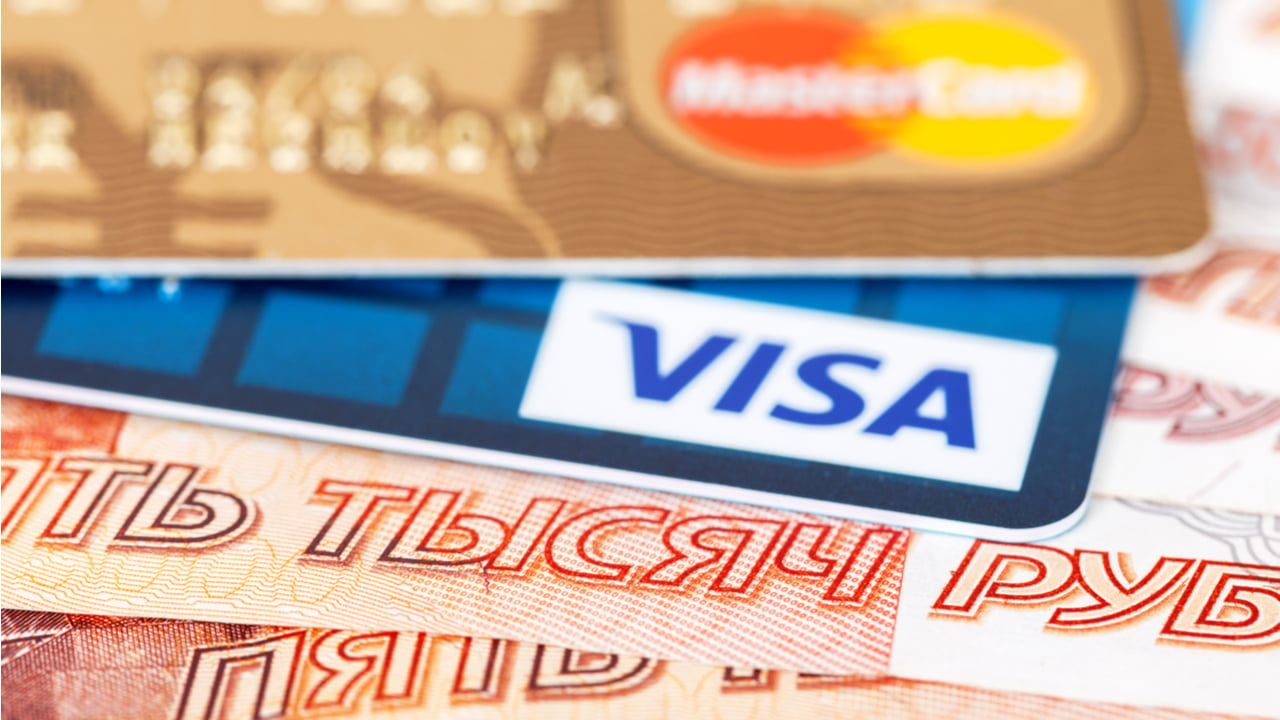 Crypto exchange Binance has blocked transactions with Mastercard and Visa cards issued in the Russian Federation. The trading platform announced the move after the American payment giants decided to halt operations in Russia over its military invasion of Ukraine. Russians Unable to Use Their Mastercard and Visa Cards on Binance Starting on Wednesday, March 9, […]
Crypto exchange Binance has blocked transactions with Mastercard and Visa cards issued in the Russian Federation. The trading platform announced the move after the American payment giants decided to halt operations in Russia over its military invasion of Ukraine. Russians Unable to Use Their Mastercard and Visa Cards on Binance Starting on Wednesday, March 9, […]
Crypto exchange Binance says that MasterCard and Visa cards issued in Russia cannot be used on its platform after the payments giants decided to suspend their operations in the sanction-hit country. In a statement, the exchange says that Russian-issued MasterCard and Visa cards will not work on Binance starting Wednesday, March 9th. “Effective Wednesday, 2022-03-09 […]
The post Here’s Why Russian-Issued MasterCard and Visa Cards Are Now Unusable on Binance Crypto Exchange appeared first on The Daily Hodl.

"Visa and Mastercard dig their own graves by politicizing their products and pushing people all over the world toward Bitcoin," said Marty Bent.
Cryptocurrency exchanges and financial services companies will soon likely no longer be able to accept transactions completed with many major credit cards following the companies ceasing operations for Russia-based users.
On Saturday, Visa, Mastercard, and PayPal announced they would be suspending operations in Russia following the country’s military actions in Ukraine. Visa called Russia’s actions an “unprovoked invasion” while Mastercard said its decision was aimed at supporting the Ukrainian people. The following day, American Express made a similar announcement, saying it would stop operations in both Russia and neighboring Belarus.
Apple Pay and Google Pay reportedly have restricted services for some Russians, though users also likely wouldn’t be able to use the aforementioned credit cards for transactions on the payment apps.
We are grateful to @Dan_Schulman for #StandingwithUkraine and for suspending business in russia. It makes a huge difference. @PayPal we welcome you in Ukraine! Your presence will provide more financial freedom to 40 million of Ukrainians in these difficult times.
— Mykhailo Fedorov (@FedorovMykhailo) March 8, 2022
The decision from three major U.S. credit card companies and others to stop operating in Russia seemed to have been independent from efforts to comply with economic sanctions, which applied to certain Russian banks and wealthy individuals. Coinbase announced on Sunday that it had blocked more than 25,000 wallet addresses “related to Russian individuals or entities we believe to be engaging in illicit activity,” but at the time of publication has not publicly addressed the credit card ban.
Following the change in the companies’ policies, average Russians using Visa or American Express credit cards abroad or within the country would seemingly no longer be able to use them for everyday transactions. Cards from Mastercard issued by Russian banks will no longer be supported by the company’s network, while those issued by other foreign banks “will not work at Russian merchants or ATMs.”
"We don't take this decision lightly," said Mastercard, which has operated in Russia for more than 25 years.
However, Russia’s central bank issued a statement on Sunday saying both Mastercard and Visa cards would “continue to operate in Russia as usual until their expiration date,” with users able to use ATMs and make payments. It’s unclear how the Central Bank of Russia reached this conclusion given the statements from the credit card companies, but it acknowledged that cross-border payments and using the cards in person abroad would not be possible.
Though the companies did not provide an exact timeline on when operations would cease entirely, at least one cryptocurrency exchange warned users of the change, which is likely to affect many Russian users. On Tuesday, Binance announced starting on Wednesday, the exchange would no longer be able to take payments from Mastercard and Visa cards issued in Russia — the company doesn’t accept American Express.
This is out of our hands. Not our decision. https://t.co/K3mH75Ul3B
— CZ Binance (@cz_binance) March 8, 2022
Presumably, all consumers wishing to buy crypto through an exchange with a credit card issued in Russia from one of these companies will be unable to do so soon, though peer-to-peer transactions would seemingly still be available. There were mixed reactions from social media on the decision, with many claiming the credit card companies could help Ukraine by hurting Russia economically, but at the expense of civilians who had no say in their country’s military actions.
“Preventing Russian citizens who are trying to flee Russia from accessing their money is a crime,” said Marty Bent, co-founder of crypto mining firm Great American Mining. “Visa and Mastercard [are digging] their own graves by politicizing their products and pushing people all over the world toward Bitcoin.”
“For somebody staying in Russia the cards keep working, but you can’t leave because you’ll not be able to pay for anything,” said Twitter user Inna, who claimed to be living in Moscow. “Putin approves.”
As I warned about two weeks ago. #crypto is only the way. #visa Ana #Mastercard just showed the world how unstable, unrelated, centralized and political they are by abandoning Russian people that are so far from the war and Russia as it is possible. This is a modern fascism. https://t.co/wnHEtoKO0J
— Anti Danilevski (@AntiDanilevski) March 6, 2022
Related: Crypto offers Russia no way out from Western sanctions
While cutting off Visa and Mastercard is a seeminglysignificant blow to Russia and its residents, reports suggest the country may turn to Chinese payment systems like UnionPay — accepted by peer-to-peer cryptocurrency exchange Paxful. Russia’s central bank also has its own Mir cards for payments domestically and in nine countries including Belarus and Vietnam.
Regulators have not issued guidelines to crypto exchanges aimed at cutting Russian users off from trading their coins. Both the United States and the European Union have hinted they would be looking at Russia potentially using transactions in digital currencies to evade sanctions. Leaders at many exchanges, including Kraken, have issued statements saying they will comply with government guidance, but not unilaterally block all Russian users.
 A popular destination for many Russians, Thailand is now looking for ways to facilitate their payments amid widening western sanctions over Moscow’s military invasion of Ukraine. Cryptocurrency is one of the options being explored by the tourism industry as Russian citizens now face financial restrictions. Authorities in Thailand Consider Accepting Cryptocurrency From Russian Visitors Talks […]
A popular destination for many Russians, Thailand is now looking for ways to facilitate their payments amid widening western sanctions over Moscow’s military invasion of Ukraine. Cryptocurrency is one of the options being explored by the tourism industry as Russian citizens now face financial restrictions. Authorities in Thailand Consider Accepting Cryptocurrency From Russian Visitors Talks […] The world’s leading payment processors Visa and Mastercard have joined sanctions against Russia over its military invasion of Ukraine. The American companies announced suspension of operations in the Russian Federation although Russians will be able to use their cards inside the country. Card Payment Giants Visa and Mastercard Add to Pressure on Russia Over Ukraine […]
The world’s leading payment processors Visa and Mastercard have joined sanctions against Russia over its military invasion of Ukraine. The American companies announced suspension of operations in the Russian Federation although Russians will be able to use their cards inside the country. Card Payment Giants Visa and Mastercard Add to Pressure on Russia Over Ukraine […] On Tuesday, Cambridge Centre for Alternative Finance (CCAF) at Cambridge Judge Business School announced a new research initiative focused on the “growing digital asset ecosystem.” According to CCAF, the newly launched collaborative effort involves 16 financial institutions such as the Bank for International Settlements (BIS), Accenture, EY, Goldman Sachs, and more. CCAF Launches 2-Year Research […]
On Tuesday, Cambridge Centre for Alternative Finance (CCAF) at Cambridge Judge Business School announced a new research initiative focused on the “growing digital asset ecosystem.” According to CCAF, the newly launched collaborative effort involves 16 financial institutions such as the Bank for International Settlements (BIS), Accenture, EY, Goldman Sachs, and more. CCAF Launches 2-Year Research […]
Some regulators were recently concerned about the alleged lack of consistent and transparent data on crypto markets.
The University of Cambridge is collaborating with some of the world’s top banking institutions and private companies to introduce a new project targeting cryptocurrency research.
The Cambridge Center for Alternative Finance, or CCAF, has launched a research initiative aiming to bring more insights on the rapidly growing digital asset industry, the CCAF announced to Cointelegraph on Monday.
Dubbed the Cambridge Digital Assets Programme, or CDAP, the project is a public-private collaboration with 16 companies including public institutions like the Bank for International Settlements Innovation Hub and the International Monetary Fund. The initiative also includes banks like Goldman Sachs, financial giants like Mastercard and Visa, as well as major exchange-traded fund providers like Invesco.
Other participants include British International Investment, Dubai International Financial Center, Ernst & Young, Fidelity, the United Kingdom's Foreign, Commonwealth and Development Office, Inter-American Development Bank, London Stock Exchange Group, MSCI, and the World Bank.
As its core mission, the CDAP intends to enable evidence-based public dialogue about the opportunities and risks associated with the growing cryptocurrency adoption. The program will be focused on three main areas including crypto’s environmental implications, infrastructure, and digital assets, including stablecoins, central bank digital currencies, as well as cryptocurrencies.
According to the announcement, the program builds on the CCAF’s existing work in the crypto industry including the development of the Cambridge Bitcoin Electricity Consumption Index, CBECI. The CBECI is a widely-referred index to provide the global Bitcoin (BTC) mining hash rate distribution percentage among countries.

Other CCAF’s crypto research developments include the Global Cryptoasset Benchmarking Study series, designed to address ecosystem trends, inform regulation and policy discussion and others.
“The Cambridge Digital Assets Programme that we are launching today aims to meet the resulting need for greater clarity by providing data-driven insights through collaborative research involving public and private sector stakeholders,” CCAF executive director Bryan Zhang said.
According to CCAF digital assets lead Michel Rauchs, the CDAP will provide decision-makers with the objective analysis and empirical evidence that they need to navigate the digital assets industry.
Related: Global financial regulator wants more data to measure risks of Bitcoin
As previously reported by Cointelegraph, some global regulators have been increasingly concerned about risks associated with the lack of standardized and trusted data in the cryptocurrency industry. In mid-February, the Financial Stability Board warned that the crypto market lacks consistent and transparent data and its linkages with the core financial system, which poses a significant risk amid the rapid crypto adoption.

The initiative is focused on expanding credit and financing options for small- and medium-sized businesses in Latin America.
Crypto-focused enterprise payment platform Tribal Credit has partnered with Visa to expand credit and financing options for small- and medium-sized enterprises across Latin America, highlighting the growing synergies between traditional payment providers and the blockchain industry.
The partnership with Visa allows Tribal to issue business credit cards in local denominations and currencies across Latin America, including Mexico, Brazil, Colombia, Argentina, Chile, Peru, Panama, Uruguay and the Dominican Republic. A Tribal spokesperson informed Cointelegraph that the company’s initial focus is on providing this credit facility to the countries of Colombia, Peru and Chile.
While the Visa partnership is centered around providing small businesses with traditional financing solutions, Tribal’s technology also allows enterprises to utilize cryptocurrencies and blockchain technology to accept payments and transfer funds. In December 2021, Tribal partnered with Latin American crypto exchange Bitso and the Stellar Development Foundation to create a new enterprise cross-border payment service that utilizes Stellar’s USD stablecoin.
Tribal highlighted El Salvador’s Bitcoin Law and the growing acceptance of cryptocurrencies in Latin America as reasons to continue developing blockchain-based payment solutions.
https://t.co/rzNJRigp5u https://t.co/rzNJRigp5u
— Indira Kempis de I. (@IndiraKempis) February 22, 2022
Related: Mexican senator to propose crypto law: ‘We need Bitcoin as legal tender’
Visa, too, has broadened its outlook on cryptocurrencies and has even developed a blockchain interoperability project for digital payments. The project, dubbed “Universal Payment Channel,” is researching blockchain interoperability with the aim of streamlining digital asset transfers across chains. In December 2021, the credit card giant announced a new crypto consulting service aimed at helping merchants and banks integrate digital assets into their business models.
Interestingly, Visa has also dabbled in the nonfungible token market after purchasing a CryptoPunk for $150,000 in August 2021. The same month, Visa published a white paper touting NFTs as a "promising medium for fan engagement."

"There could be individual situations where a consulate might also accept other proof of assets, such as crypto-assets," said Laura Bernard of the European Commission.
For international travelers still able to cross borders amid an ongoing pandemic, using cryptocurrency to prove they have the means to sustain themselves abroad is a relatively new concept.
Many countries around the world are closed to visitors in an effort to protect their residents from COVID-19, but some have continued to allow students, retirees, and others seeking medium- to long-term stays through immigration. Under normal circumstances, entrants are sometimes required to present evidence of funds, both to show they have the necessary savings to provide for themselves and are less likely to work illegally.
The definition of this “Evidence of Funds” or “Proof of Funds” can be fluid, but is usually considered a bank statement, a line of credit, or simply showing an immigration officer cash holdings. However, of the 195 recognized countries on the planet, some have hinted they are open to accepting cryptocurrency as proof of financial sufficiency — as long as liquidity was established.
“In my 15+ years, I've never seen a consulate accept non-liquid financial documents, such as a holding portfolio, even if there are seven figures in the account,” said Evan James, COO of visa and passport processing company Peninsula Visa. “I do understand that crypto is liquid but I think it would need to present almost as a bank account [...] in the event an applicant would want to use a crypto account, the onus would be on them to make sure the consulate is comfortable with its liquidity.”

The United Kingdom's government website said that "Bitcoin savings" was unacceptable financial evidence for student visa applicants. One of the consulates from a Schengen member — which includes 26 European countries — told Peninsula Visa that it would only be willing to accept fiat bank statements at this time for proof of funds. However, other immigration departments hinted that there was nothing explicitly prohibiting travelers from using crypto to meet this requirement.
"There is no ban on using cryptocurrency as evidence of funds but applicants would need to provide evidence of the amount and ownership,” said Immigration New Zealand manager Marc Piercey. “Visa applicants are likely to find it easier to show more traditional forms of funds such as bank statements or credit card balances.”
Laura Bernard, press officer for the European Commission, reiterated that bank statements or proof of income was needed “in almost all cases,” but added that there wasn’t a universal policy for all EU member nations:
“As each visa application is assessed on a case-by-case basis, there is no one-size-fits-all rule regarding the proof of sufficient financial means. As a result, there could be individual situations where a consulate might also accept other proof of assets, such as crypto-assets, whenever this is justified by the particular circumstances of the applicant and the intended journey.”
Related: Around El Salvador in 45 days: A Bitcoin-only travel story
Cointelegraph reporter Brian Quarmby, a HODLer who plans to relocate abroad, said he presented his crypto portfolio, salary history, and “a tiny bit of cash” to a consular officer as part of his application for a spousal visa. At the time of publication, the country is closed to short-term visitors and only recently reopened for a limited number of foreign students and business travelers.

The "Oracle of Omaha" now has more companies in his portfolio that have direct/indirect exposure to Bitcoin and similar cryptocurrencies.
Warren Buffett's Berkshire Hathaway dumped a portion of its Visa and Mastercard holdings and increased exposure in Nubank, the largest fintech bank in Brazil that's also popular among the country's Bitcoin investors.
In a securities filing late Monday, the industrials conglomerate disclosed that it had purchased $1 billion worth of Nubank Class A stock in Q4/2021. On the other hand, it sold $1.8 billion and $1.3 billion worth of Visa and Mastercard stock, respectively, signaling a shift away from credit companies to gain exposure in their fintech rivals.
Buffett, the so-called "Oracle of Omaha," is popular for his cautious approach to investing, particularly in the market's hottest sectors such as fintech. The veteran investor had also downplayed emerging decentralized finance solutions like Bitcoin (BTC), ridiculing it as an asset that "does not create anything."
But Berkshire's new stake in Nubank shows that Buffett has been softening up to fintech lately. In detail, the firm had invested $500 million in the startup in July 2021. Its returns on the said investment amounted to $150 million in Dec. 2021 after Nubank debuted on the New York Stock Exchange (NYSE).
$NU Buffett-backed Nubank stock set for NYSE debut as IPO pricing valued company at about $41.5 Billion.
— InvestingDesk (@InvestingDesk) December 9, 2021
The company raised $2.60 Billion as it sold 289.15 Million shares in IPO. Berkshire bought 10% of the shares in the offering.#fintechnews pic.twitter.com/HTujZZvCtJ
So far, Buffett has not shown any intention to sell his position in Nubank.
Buffett's additional investment into Nubank shows his acknowledgment of the fintech sector's underlying theme: the digitization of financial services, as well as his willingness to associate with companies that are involved in the cryptocurrency sector.
In detail, Easynvest, a trading platform that Nubank acquired in September 2020 has been actively offering a Bitcoin exchange-traded fund (ETF) since June 2021. Dubbed QBTC11, the ETF is backed by QR Asset Management and is listed on the B3 stock exchange, the second-oldest bourse in Brazil.
Thus, it appears that Nubank, which remains exposed to the emerging crypto sector via Easynvest, could use the additional revenue opportunities to benefit its top investor, Warren Buffett, despite his views that Bitcoin is a "rat poison squared."
That is primarily because of the growth of crypto-related investment products in 2021. Notably, their numbers doubled in the year, rising from 35 to 80, as per Bloomberg Intelligence data, while the total valuations of the assets they held reached $63 billion versus $24 billion at the start of 2021.

Emily Portney, chief financial officer at Bank of New York Mellon Corp. — another firm in Buffett's investment portfolio, noted that digital assets could become a "meaningful source of revenue" for investment banking firms in the future as Bitcoin investment vehicles become more mainstream.
Related: Bitcoin’s 30% recovery in two weeks has BTC whales back in accumulation mode
Meanwhile, Leah Wald, chief executive of crypto-asset manager Valkyrie Investments, predicted an increase in the capital flows into crypto-related investment vehicles, saying they have become a "phenomenon that's starting to take off." Wald:
"If you look at inflows from a volume perspective, not only has it been steady even with the price corrections that Bitcoin is notoriously famous for, but you're seeing a lot of institutions jump in."
While Buffett might not invest in Bitcoin directly, he is already gaining indirect exposure as companies in his portfolio foray into the crypto sector.
For instance, in October 2021, just a month before Bitcoin reached its all-time high of $69,000, fifth-largest U.S. bank, U.S. Bancorp, launched a cryptocurrency custody service for its institutional investment managers, noting that they witnessed an increase in demand from their "fund services clients" over the last few years.
Similarly, in another announcement made October 2021, Bank of America launched a cryptocurrency research initiative, citing "growing institutional interest."
Months before, BNY Mellon announced that it would hold, transfer, and issue Bitcoin and similar cryptocurrencies for its asset-management clients.
Announcing the creation of the BNY Mellon Digital Assets unit - A team dedicated to building the first multi-asset custody and administration platform for traditional and digital assets, including #cryptocurrencies. https://t.co/aZ7wMfAXqg pic.twitter.com/L54TFVpJNv
— BNY Mellon (@BNYMellon) February 11, 2021
"The Nubank investment can be tagged as Buffett's way of supporting the fintech/crypto world without taking back his criticisms of the past," asserted Greg Waisman, co-founder and COO of crypto wallet service Mercuryo, adding that the Berkshire boss is now backing the "digital currency ecosystem indirectly."
"Even an indirect exposure is bound to increase the positive sentiment that may push more investors into the space."
The views and opinions expressed here are solely those of the author and do not necessarily reflect the views of Cointelegraph.com. Every investment and trading move involves risk, you should conduct your own research when making a decision.
The views and opinions expressed here are solely those of the author and do not necessarily reflect the views of Cointelegraph.com. Every investment and trading move involves risk, you should conduct your own research when making a decision.